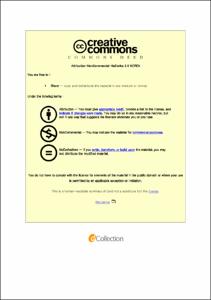Exploring Meaning-Discovery Strategy Use:
- Abstract
- 본 연구는 중급 영어 학습자가 단어와 숙어의 의미를 이해하는 전략들을 분석하였다. 본 연구는 문법적인 기능, 의미의 투명성 (transparency), 숙어를 구성하는 단어의 빈도수와 같은 어휘적 요인이 전략의 선택에 끼치는 영향과 학습자의 전략 선택의 효율성을 조사하여 단일어와 숙어에 있어서의 전략 사용의 차이를 분석함으로써 학습자가 사용하는 의미 발견 전략에 대한 통찰을 제시하고자 한다. 본 연구에서 사용된 데이터(자료)의 세 가지 출처는 다음과 같다: 전략의 사용과 효용성에 대한 설문지, 전략 사용에 대한 과업을 포함한 온라인 설문지, 그리고 사고 구술(think-aloud protocol)이다. 본 연구의 결과는 한국의 중급 수준의 영어 학습자가 구술 새로 접한 어휘의 의미를 발견하기 위해 문맥적인 요소와 사전을 이용함을 보여주었다. 또한, 단일어와 숙어에 대해 사용하는 전략 사이와, 서로 다른 어휘적인 요인을 가진 어휘들 사이에서 사용되는 전략의 차이는 거의 없는 것으로 밝혀 졌다. 문맥적인 단서를 사용하는 것이 숙어의 의미 이해에 대해 효과적인 반면, 사전을 사용하는 것이 유일하게 일관되게 효과적인 의미 발견 전략으로 보여진다. 이러한 결과에 대한 교육적 함의와 향후 연구에 대한 계획이 방향은 제시하였다.
- Issued Date
- 2017
- Awarded Date
- 2017. 2
- Type
- Dissertation
- Keyword
- idioms vocabulary strategies
- Publisher
- 부경대학교 대학원
- Affiliation
- Pukyong National University
- Department
- 대학원 영어영문학과
- Advisor
- 오준일
- Table Of Contents
- I. Introduction 1
1.1 Purpose of the Study 1
1.2 Research Questions 8
1.3 Key Terminology 9
II. Literature Review 11
2.1 Vocabulary and Vocabulary Knowledge 11
2.1.1 Vocabulary: Single-Word Items and Idioms 11
2.1.2 Types of Idioms 15
2.1.3 Lexical Knowledge 24
2.2 Vocabulary Acquisition and Comprehension 27
2.2.1 Processes of Vocabulary Acquisition 27
2.2.2 Factors Affecting Acquisition 30
2.3 Vocabulary Learning Strategies 37
2.3.1 Defining and Classifying Vocabulary Learning Strategies 37
2.3.2 The Role of Vocabulary Learning Strategies 40
2.4 Studies of Vocabulary Learning Strategies 42
2.4.1 Vocabulary Learning Strategy Use in General 42
2.4.2 Vocabulary Learning Strategy Use on Idioms 45
2.5 Questions Not Answered by Previous Research 48
III. Methodology 51
3.1 Preliminary Study 51
3.1.1 Methodology of the Preliminary Study 51
3.1.2 Results of the Preliminary Study 55
3.2 Research Questions 62
3.3 Participants 63
3.4 Quantitative Instruments 65
3.5 Qualitative Instruments 74
3.6 Procedures for Gathering and Analyzing Data 76
3.6.1 Procedures for Gathering Quantitative Data 76
3.6.2 Procedures for Gathering Qualitative Data 78
3.6.3 Procedures for Analyzing the Data 82
IV. Results 88
4.1 Differences in Meaning-Discovery Strategy Use Between Single-Word Items and Idioms 88
4.1.1 Data from the Meaning-Discovery Process Survey 88
4.1.2 Data from the Think-Aloud Protocols 95
4.1.3 Summary 109
4.2 Meaning-Discovery Strategy Use Dependent on Intra-Lexical Factors 110
4.2.1 Data from the Meaning-Discovery Process Survey 110
4.2.2 Summary 123
4.3 Effectiveness of Meaning-Discovery Strategy Use 123
4.3.1 Data from the Meaning-Discovery Process Survey 123
4.3.2 Data from the Think-Aloud Protocols 130
4.3.3 Summary 142
4.4 Discussion of Findings 143
4.4.1 Differences in Strategy Use Between Single-Word Items and Idioms 143
4.4.2 Differences in Strategy Use Based on Intra-Lexical Factors 145
4.4.3 Effectiveness of Meaning-Discovery Strategy Use 148
V. Conclusion 154
5.1 Summary 154
5.2 Pedagogical Implications 157
5.3 Limitations 165
5.4 Implications for Future Research 167
References 173
- Degree
- Doctor
- Files in This Item:
-
-
Download
 Exploring Meaning-Discovery Strategy Use:.pdf
기타 데이터 / 812.92 kB / Adobe PDF
Exploring Meaning-Discovery Strategy Use:.pdf
기타 데이터 / 812.92 kB / Adobe PDF
-
Items in Repository are protected by copyright, with all rights reserved, unless otherwise indicated.